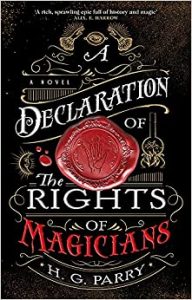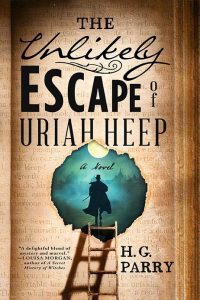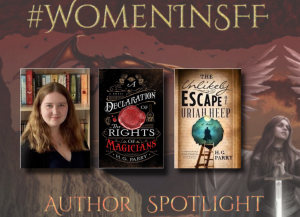Interview with H. G. Parry (THE UNLIKELY ESCAPE OF URIAH HEEP)
H.G. Parry is a fantasy writer based in Wellington, New Zealand. Her short fiction has appeared in Intergalactic Medicine Show, Daily Science Fiction, and small press anthologies. She holds a PhD in English Literature from Victoria University of Wellington, and teaches English Literature, Film, and Media Studies. She lives in a book-infested flat by the beach, which she shares with her sister, three guinea pigs, and two over-active rabbits.
Hi Hannah, welcome to the Hive!
Hi! Thanks so much for having me!
Congratulations on your new release The Declaration of the Rights of Magicians! How does it feel to have your second book out there in the wild?
Thank you! Exciting and terrifying in equal measures, honestly. It probably feels a little like having a child leave home—I’m so proud of it for being out there, and so very much hoping that it will find people who love it.
 As The Declaration of the Rights of Magicians has only just been released in June, can you tell us a little bit about it please? What can readers expect?
As The Declaration of the Rights of Magicians has only just been released in June, can you tell us a little bit about it please? What can readers expect?
Declaration is the first part of a duology that together tells the story of the French Revolution, the Haitian Revolution, and the British abolition movement in a world where magic is real and jealously guarded by the ruling classes. It’s a very detailed, sprawling, dialogue-heavy, character-driven historical fiction, but with magic. So—revolutions and shadows and politics, vampires and magic and parliamentary debates, and people fighting to change the world.
When writing this second book, was the process any different from when you wrote your debut? Was the experience easier or harder?
In some ways, Declaration was my first book—I wrote the early version of it before I wrote Unlikely Escape, rewrote it while Unlikely Escape was still on submission, and the bulk of the edits were done before Unlikely Escape came out—so it didn’t carry any of the pressure that comes with writing a second book. It was longer and more research-heavy but not really more difficult, and I thought I’d been very clever and dodged second book syndrome. But I’m writing the sequel now and it feels impossible, so it turns out I wasn’t clever at all. (I make this discovery a lot.)
Your debut The Unlikely Escape of Uriah Heep brings classic literary characters to life. Which was your favourite classic literary character to write about? Which female one would you most want to meet in real life if that was possible?
I loved writing Dorian Gray—it’s so satisfying sometimes to write a person who is clever and funny and gothic and utterly amoral. In real life—I love all the classic female characters in the book (Matilda, Miss Mattie, Nancy, Jadis, Scheherazade), but if I got to meet one myself, I’d probably meet Jane Eyre. The way she fights for her happiness and insists on her equality to any person living is still the fiercest, most inspiring thing I’ve ever read, plus we could gossip about Mr Rochester. Having said that, I’d love to see what Becky Sharp would make of the modern world as well!
Since this is our Women in SFF month, who were the women in SFF (or beyond) that influenced or inspired you? (Authors and/or characters!)
Oh, so many. Authors—Mary Shelley, Sherryl Jordan, Rosemary Sutcliff, Daphne du Maurier, Tamora Pierce, Gail Carson Levine, Malorie Blackman, Anne McCaffrey, Susan Palwick, Nancy Kress, Beatrix Potter, Susanna Clarke, Laini Taylor, VE Schwab, Hilary Mantel. Characters—Ella from Ella Enchanted, Kel from Protector of the Small, T’Pol and Hoshi Sato and Captain Janeway and Seven of Nine and Uhura from Star Trek, Aravis from The Horse and his Boy, Elsha from Winter of Fire, Eowyn from The Lord of the Rings, so many others I’ve forgotten.
Aravis!
What are your favourite kind of female characters to write?
Many different kinds, but I have a real fondness for women who are outwardly confident and inwardly struggling to work out who they want to be. I loved writing Millie in Unlikely Escape.
What’s a good SFF book (written by a woman) you’ve read recently?
My favourites I’ve read so far this year have been Circe by Madeline Miller, The Once and Future Witches by Alix Harrow, and The Bone Shard Daughter by Andrea Stewart. All three are very different, and all in their own way just beautiful, character-driven, wonder-filled, quietly-or-loudly revolutionary stories.
 If you could co-write or co-create a series, which author would you choose to work with and why?
If you could co-write or co-create a series, which author would you choose to work with and why?
Jane Austen—she can do the romance and social comedy, and I can add fairies and vampires and dragons, and it would be the best series ever. Besides, we could set it in the Regency period without having to do any historical research!
I would read that in a heartbeat.
What piece of advice have you found the most useful during the process of writing?
Don’t hold back all your best ideas for the end of the book. Use them early, let the characters deal with them, and trust yourself to come up with something even better later.
What do you most love to do, other than writing?
This is a bittersweet answer given the state of the world, but I love travelling, especially in Europe and the UK—I love staying in tiny hotels, hopping on a train everyday to go someplace I’ve never been before, getting lost in crooked streets, finding new bookshops, exploring old castles and museums, and going to plays at night.
What can readers expect to see from you next, Hannah? Will you be writing more standalone books, or will you venture into a series in the future?
Right now I’m working on the follow-up to Declaration, which is the final book in the Shadow Histories. Once that’s out, I think I’ll stick to standalones for a while—but having said that, Declaration started as a standalone and grew, so I can never be sure!
Lastly, and of course we save the most important question for last! What is your favourite fantastical creature? Which would you ride into battle on?
It used to be a unicorn, but recently I found out about the Almiraj, a rabbit with a unicorn horn, and that’s obviously even better. But I’d ride into battle on a dragon, because nothing can defeat a dragon.
Thank you, Hannah.
Thank you for such great questions!

